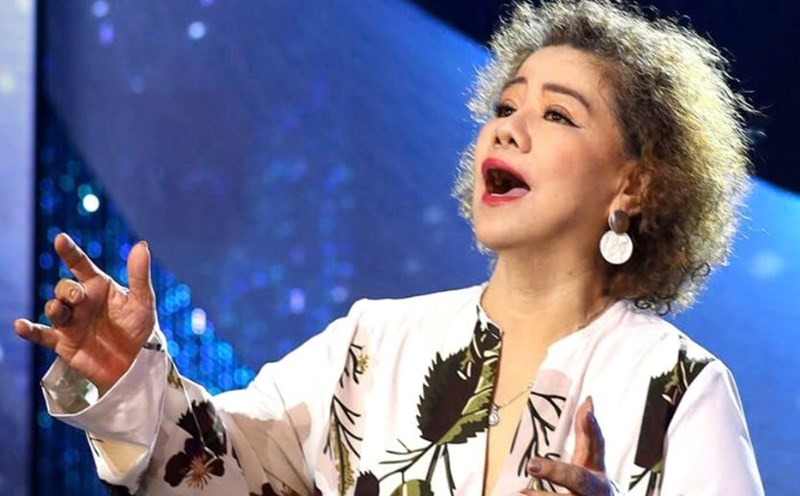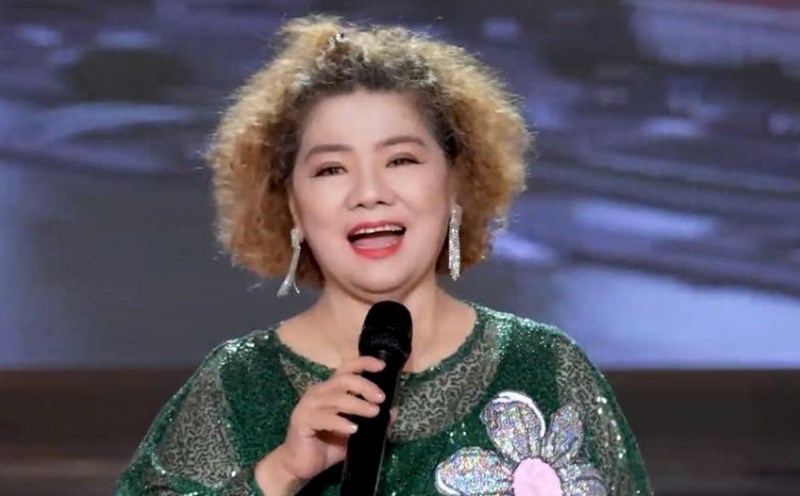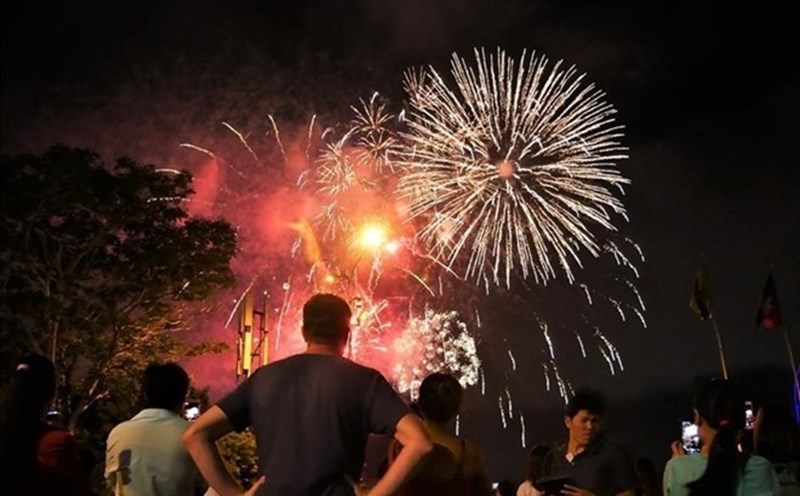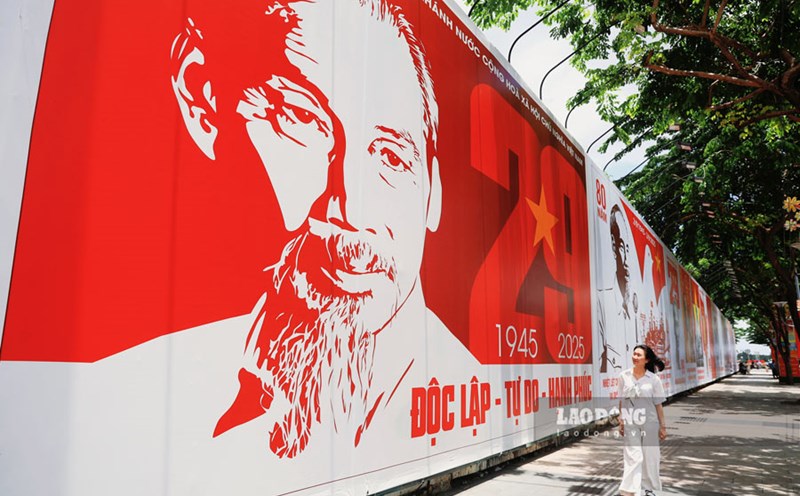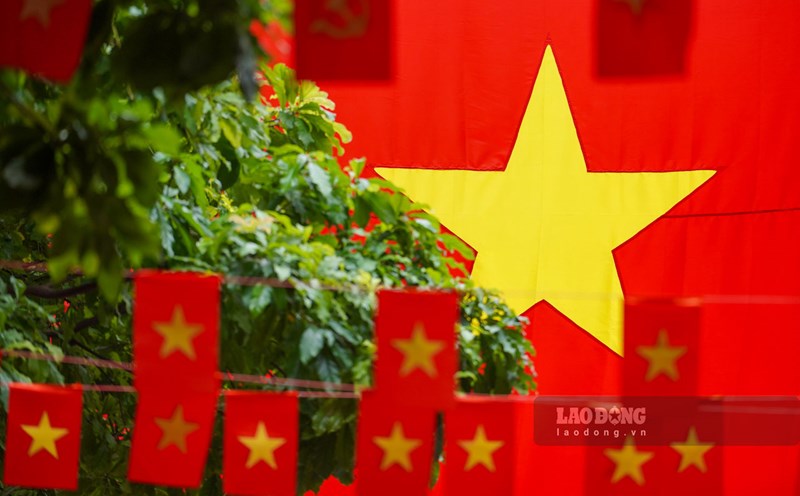If you find it on digital platforms, there are many documentary videos about People's Artist Thanh Hoa's voice, including a video recording her voice with the song "Uncle Ho, a long love" from 1980, or the song "Loi Ba day before going far"... that are all extremely touching. Throughout her life, at different stages, she has sung songs about Uncle Ho, are the emotions different? In the 1980s - 1990s, singing "Uncle's words before going far away" or "Uncle Ho has a great love"... is different now?
- Uncle Ho is an endless source of inspiration in art and culture, including music. Perhaps any author or musician would have chosen the most subtle and best to write a song praising Uncle Ho, expressing gratitude to Uncle Ho. I am proud to be one of the singers who sings a lot about Uncle Ho. The reason is partly because I work in the radio, and most of the songs about Uncle Ho are sent to the radio by the author, such as "Uncle Ho has a great love", "Vang Trang Ba Dinh", "On Uncle Ho's monument", "Viet Lang Bac", "Uncle's teaching before going far" ...
I haven't seen Uncle Ho. I only remember the day my Uncle passed away, I was on my way back to my hometown, when I suddenly saw everyone crying. Everyone turned to the loudspeaker. Then they hugged and cried, as if a relative, a person of great love had passed away. The boundless love that the Vietnamese people have for Uncle Ho has created an endless source of emotions for me every time I sing about him.
Once, I was able to go to Uncle Ho's house and sing on the occasion of Uncle Ho's death anniversary. When I sang, everyone in that room cried.
I am honored and proud to sing such good songs. The musicians have spent their whole life working hard to have a work to pay tribute to Uncle Ho, and I have been able to express the emotions that are permeated by a beautiful melody singing about Uncle Ho. I have such impressions, of Uncle Ho, of the Day of the Union, of the Truong Son range, of the soldiers during the war. I have the happiness of an artist who can perform, sing on every kilometre of the Fatherland, going through ups and downs with the country.
When I recorded the song "Uncle Ho, a long love", the conductor and the arrangers were all silent. Author Thuan Yen also said that "or not anymore", even though I had a meeting. Because the emotions at that time were very genuine. That was my beautiful memory, and I didn't think this work would be so popular.
Singing about Uncle Ho and the Fatherland, I always respect and am grateful.
How do you position and define the name Thanh Hoa?
- To me, the name Thanh Hoa is like an arrangement of the emperor. When I studied at the Conservatory of Music, I worked at the Liberation Radio Station. At that time, the station had Mr. Thanh Hung and Ms. Ngoc Hoa as two veteran actors with good salaries. Everyone at the stage loves and compliments me for being cute, so they want to name me. My name is Thanh, with Thanh Hung and Ngoc Hoa. So the names of the brothers and sisters were merged into Thanh Hoa, taking the stage name for me. Later, I married Phan Lac Hoa. The name has two combined fates, and Thanh Hoa has been with me for the rest of her life. Sometimes I think this name is not exactly what I want, but as an arrangement, to have a name associated with many memories in my life.
Having gone through many ups and downs, going through many changes of the times, do you think you are also a historical witness?
- I never thought that I would sing to become famous, until one day that singing sound penetrated places where human feet could not step. Uncle Ho teaches cultural soldiers to understand that they are the connector, bringing joy, bringing pride, and also depicting history through melody, cinema, poetry, and art.
Thanh Hoa alone cannot be a witness to history, but all cultural soldiers, the whole music industry, are historical witnesses. All songs such as Noi Thanh Nhut Em, Bac Da Ngay Cuoc Nhoan Duong, Canh chim Dien Chieu, 5 Anh Trai Trong Un Thanh are historical witnesses and I am just a contributor to making those works connect the mach from music to the hearts of listeners, through each stage.
At the age of 75, she is still tired of work. Most recently, she participated in founding the Center for the Conservation of Traditional Vietnamese Performing Arts. What was your biggest wish when establishing this center?
- This is something I have been worried about for a long time. Vietnam has many artistic quintessence, recognized by the world as an intangible cultural heritage. But I feel a little sad because all of Vietnam's Intangible Cultural Heritage seems to be unconnected and still operate alone. When I became President of the Association for the Protection of the Rights of Vietnam Music Performing Arts (APPA), I wanted to protect my heritage and spread it to the public. Nowadays, the younger generation understands the Ca Tru, the xoan singing, the Hue folk song, the Hanh tai tai, the Hue Royal and court music, the Bac Ninh family quan Ho, the Thai, Central Highlands folk songs, the Central Highlands gongs... I want to connect those sports and spread them, so that the Vietnamese people understand and appreciate the traditional performing arts of the nation.
We are implementing a plan to industrialize culture, build cultural and artistic sectors to reach international standards, bringing economic value to GDP. As the leader of the Vietnam Center for the Conservation of Traditional Performing Arts, how do you evaluate the potential of traditional performing arts for the cultural industry?
- As the cultural industry grew, I worked at the Vietnam Association for the Protection of the Rights of Performing Arts of Vietnam and established the Center for the Conservation of Traditional Performing Arts of Vietnam, assigning People's Artist Thanh Ngoan as director. The special combination of the center is an idea that all the center's leaders and artists desire. Artists living abroad also really want to be given the opportunity to spread the beauty of Vietnamese culture. From there, we can bring outstanding works to introduce to international audiences.
In plans to implement cultural industries, we always emphasize preserving national cultural identity, spreading the beauty of national culture... as Uncle Ho advised, "to love our Fatherland more passionately, to love folk songs". After a long journey of artistic activities, your biggest feeling when mentioning culture and history in the current social context?
- For me, artistic culture is not only singing and performing but also expresses the personality and spirit of the Vietnamese people through the ages. It contains educational and beneficial messages. Her mother's precept also teaches "father is like Thai Son mountain, mother is like water in the water flowing out, a generation of worshiping mother worships father, giving the whole act of filial piety is child worship". Our ancestors have skillfully and delicately conveyed the teachings in each folk song, proverb, and folk melody. The lyrics express the aspiration to live and the lives of Vietnamese people. I think that is the origin.
Everyone needs to be educated to be responsible, in the family, for the country. If you do not love where you were born, do not be filial to your parents, you will not be able to love anyone else.
I am always passionate about folk art, I don't want those wonderful inspirations to go away.
After retiring, People's Artist Thanh Hoa left the city, living with her family in a family of a house in the suburbs of Hanoi of more than 1,000 square meters. Can you share about your current "athletics" life?
- I live close to nature, watching the plants and taking care of the garden every day. When we first had the garden, my husband and I raised fish in ponds. But the fish are not seen, only the mosquito is raised. We filled the pond to plant grass. I bought grass in Hungary and brought it back to plant but it was not increased. After that, I decided to switch to growing vegetables and fruits. I keep figureing out how to grow vegetables and fruits, and buy big plants to grow in the garden.
Now, there are hundreds of types of fruit trees in the garden, each season is full. In my free time, I take care of the garden, look at the flowers and fruits, and find a sense of peace and relaxation.
That's enough life.

